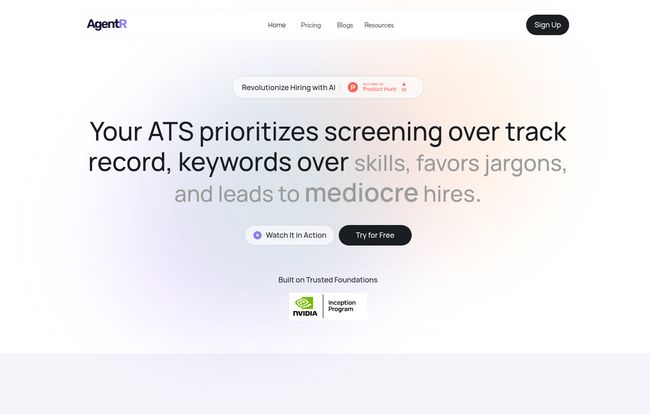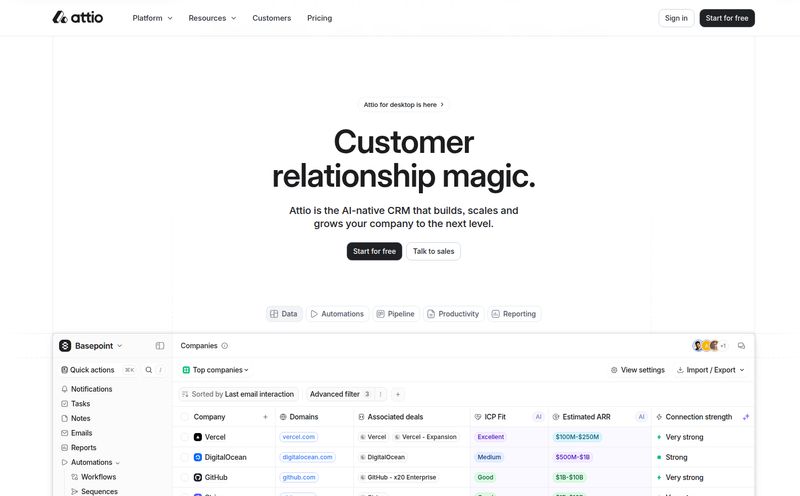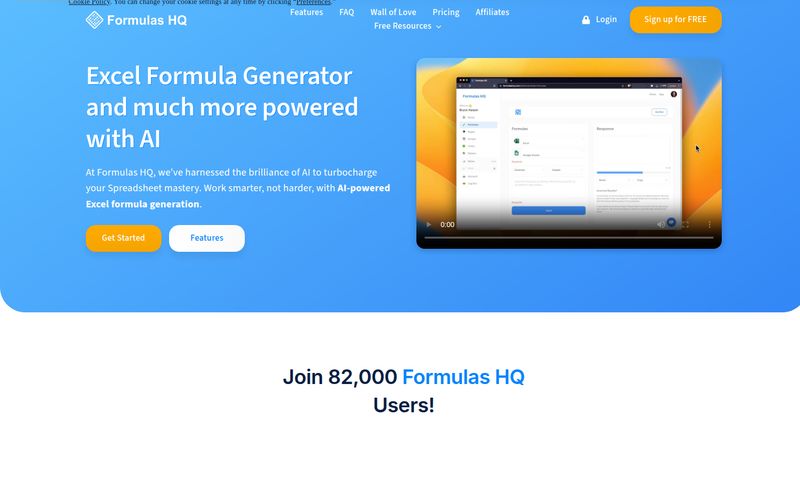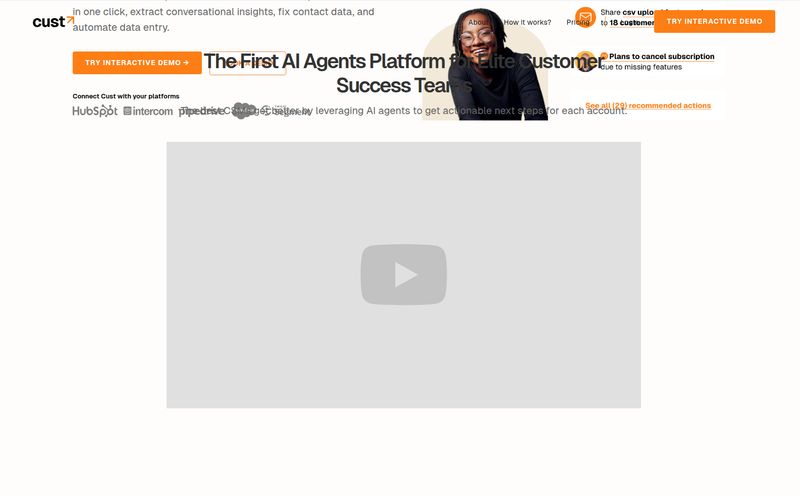You and me. For years, we've been told that technology would make hiring easier. We bought into the promise of Applicant Tracking Systems (ATS). They were supposed to be our trusty sidekicks, neatly sorting the wheat from the chaff. But if you're anything like me, you’ve had that sinking feeling in your stomach more than once. The feeling that your expensive, sophisticated ATS just tossed a future superstar's resume into the digital void because they used the word “managed” instead of “orchestrated.”
It’s maddening. The endless resume pile. The candidates who've clearly just copy-pasted your job description into their skills section. It’s a game of keyword bingo, and frankly, I'm tired of playing. We spend so much time trying to game a system that we ourselves put in place. It's ridiculous.
So, when I came across a tool called AgentR, my professional skepticism immediately kicked in. Another AI savior complex? Maybe. But their tagline caught my eye: “Your ATS prioritizes screening over track record, keywords over skills, favors jargons, and flags even the best hires.”
Well, they’re not wrong, are they? That hit a little too close to home. So, I decided to take a closer look. Is this the tool that finally lets us talk to people, not just parse PDFs?
So What Exactly Is AgentR?
On the surface, AgentR is an AI-powered hiring assistant. But that description is a dime a dozen these days. What makes it interesting is its core philosophy. It’s not built to just match keywords. It’s built to perform what they call “reasoning-driven talent analysis.”
Think of it this way: Your standard ATS is like a bouncer at a club with a very specific, and kind of dumb, dress code. “You must be wearing black shoes and have the word ‘synergy’ on your person to enter.” AgentR, on the other hand, is like the savvy club owner who’s been in the business for 30 years. They don't care about the shoes; they’re watching how people carry themselves, who they talk to, and the actual vibe they bring. They’re looking at the whole picture, the track record.
AgentR is designed to cut through the “resume engineering”—that fluffy nonsense we all know and hate—and focus on actual career patterns and real-world achievements. It looks for signals that a human recruiter would, if they had 80 hours in a day to do it.

Visit AgentR
The Tyranny of the Applicant Tracking System
I’ve been banging this drum for a while. The ATS was born out of necessity. When the internet made it possible to get 500 applications for one job opening, we needed a filter. But the filter we got was, for lack of a better word, primitive. As a study often cited by HR professionals from Harvard Business School pointed out, these systems incorrectly reject millions of viable candidates for roles they are qualified for. It’s a massive, systemic problem.
They are blunt instruments in a job that requires surgical precision. They can't understand context. A brilliant developer who spent three years at a startup that eventually failed? The ATS sees a short-term gig and a 'failure'. A human—or a smarter AI—sees someone who thrives in high-pressure environments and probably learned more in those three years than someone coasting at a corporate giant for ten.
How AgentR Tries to Fix The Mess
This is where it gets interesting. AgentR isn’t just a new coat of paint on an old system. It claims to be a different engine entirely. Here’s how it works.
Reasoning-Driven Analysis Beats Keyword Matching
This is the heart of it. Instead of just scanning for `Python`, `SEO`, or `Project Management`, AgentR analyzes the career trajectory. It connects the dots. Did this person get promoted quickly? Did they move from a small company to a major player? Did the scope of their projects consistently grow? These are the questions a seasoned hiring manager asks, and AgentR attempts to automate that intuition using over 30 different data patterns. It’s looking for evidence of performance, not just the right buzzwords.
A Smarter Score with TalentLens™
AgentR gives candidates a score using something they call TalentLens™. While they dont reveal the secret sauce (who does?), the idea is that this score is a more holistic measure of a candidate's potential. It flags high-potential people who your ATS would have missed and, just as importantly, flags the low-fit candidates early. This isn't just about finding the good; it's about saving you from wasting time on the demonstrably bad fits. Less time on screening calls that go nowhere? Sign me up.
The Actual Impact on Your Hiring Workflow
Okay, fancy tech is cool, but what does this mean for your Tuesday morning? In my view, the benefits are pretty clear.
- You save a ridiculous amount of time. The initial pre-screening slog is one of the biggest time-sinks in recruitment. Automating this with an AI you can actually trust means your team can focus on what they do best: talking to promising candidates.
- You find hidden gems. I once hired a marketing manager whose resume was, honestly, a mess. But in her cover letter, she mentioned a side project she ran that had incredible engagement metrics. My ATS would have trashed it. She ended up being one of our best hires. AgentR is designed to spot those side projects, those odd career paths, those signs of pure grit that simple keyword scanners ignore.
- You make data-driven decisions. It removes some of the unconscious bias that can creep into manual screening. The AI is looking at performance patterns, not names or backgrounds. This can lead to a more diverse and more effective team.
But Let's Be Realistic, No Tool Is Perfect
Now, I’m not going to sit here and tell you AgentR is a magic wand. There are some real-world considerations. For one, it likely needs to integrate with your existing ATS or HRIS, and anyone who's ever dealt with enterprise software APIs knows that can range from a minor headache to a full-blown migraine.
Second, the effectiveness of any AI is entirely dependent on the quality of its model and the data it's trained on. While “30+ data patterns” sounds impressive, the proof is in the pudding. If the reasoning engine is flawed, you're just automating bad decisions in a new way.
And finally, there's the human element. Some will argue that relying on AI for the initial screen removes a layer of human interaction. I get that. But I’d counter-argue that the current ATS model is already less human than a chatbot. I’d rather have an intelligent AI do the first pass so I can have a more meaningful human conversation with a better-qualified shortlist. But it’s a valid point to consider.
So, What's the Price for This AI Brain?
Here's the best part, at least for now. AgentR is currently in an “early preview” phase. According to their site, your first three job posts are completely free. No strings attached. This is a pretty confident move, and I respect it. They’re letting the product speak for itself.
After that, they say a tailored plan will be offered based on your hiring needs. This is standard for B2B SaaS, and it makes sense. A startup hiring 5 people a year has different needs than an enterprise hiring 500. For now, being able to test-drive it on three real job postings for free is a no-brainer if you’re feeling the pain of your current process.
Your AgentR Questions Answered
How is AgentR different from a standard ATS?
A standard ATS is primarily a database and a keyword filter. It stores applications and screens them based on simple, often flawed, criteria. AgentR is an intelligence layer on top of that. It doesn't just filter; it analyzes career history and performance patterns to predict a candidate's potential success.
Can AgentR replace my human recruiters?
Absolutely not. And it shouldn’t. The goal is to augment your recruiters, not replace them. It handles the soul-crushing part of the job (sifting through hundreds of irrelevant resumes) so your team can focus on the high-value, human parts: building relationships, conducting insightful interviews, and closing top candidates.
What kind of roles is AgentR best for?
While it could probably work for many roles, I imagine it shines brightest for positions where track record and performance are more important than a simple checklist of certifications. Think sales roles (where you can track quota attainment), marketing, engineering, and leadership positions where past achievements are the best predictor of future success.
Is it difficult to set up AgentR with my current systems?
The company mentions integration, which implies some setup is needed. The complexity will likely depend on your existing tech stack. However, during their early preview, you could probably run it standalone for a few roles to test its effectiveness before committing to a full integration.
What happens after my three free job posts?
After you've used your three free posts, AgentR will offer a tailored plan based on your company's hiring volume and specific needs. You'll need to contact them to get a quote for continued use.
My Final Verdict on AgentR
I’ve seen a lot of tools come and go. Most are just incremental improvements on a broken model. AgentR feels… different. It’s aiming to solve the right problem. It's not about making the keyword-matching game slightly more efficient; it's about throwing the game out the window.
By focusing on track record over jargon, it realigns the hiring process with what actually matters: finding people who have a history of doing great work. It’s a bold idea, and if they can nail the execution, it could genuinely change how we build teams.
Given that you can try it for free, I’d say it’s one of the more interesting and potentially impactful tools I’ve seen in the HR tech space in a long time. Go give it a shot. What have you got to lose, besides that mountain of irrelevant resumes?
Reference and Sources
- AgentR Official Website: www.agentr.ai
- Harvard Business School & Accenture Study on Hidden Workers and Automated Hiring: Hidden Workers: Untapped Talent



